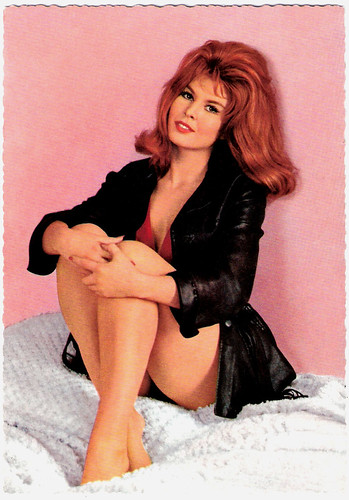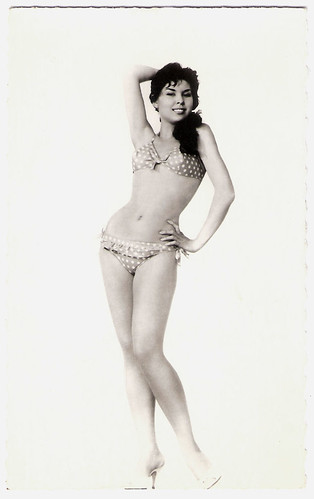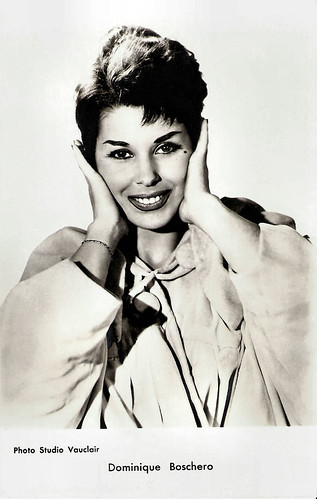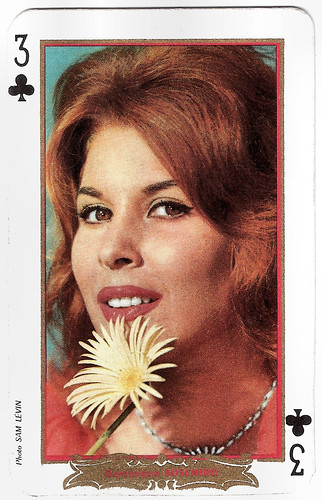
German postcard by Krüger, no. 902/357. Photo: Georg Michalke.
Showgirl
Dominique Boschero was born in Paris, France in 1934. She is the sister of actor-producer Martial Boschero. Their parents were Italian and when World War II broke out, the 5-year-old Dominique was trusted in the hands of her grandparents in Frassino, a small Italian mountain village with a few hundred inhabitants. There she grew up.
At 15, she returned to Paris and started to work as a janitor in a hospital and later she worked as a seamstress. With her tall length and her dark beauty, she found work as a model. Soon her beautiful face was on the covers of Paris’s premiere fashion magazines.
At the age of 18, she made her stage debut as a showgirl at the Paris music hall La Nouvelle Eve (The New Eve). She also played small or uncredited roles in French films, such as Club de Femmes/Club of Women (Ralph Habib, 1956) with Nicole Courcel and Dany Carrel.
A year later, Boschero had a bigger part in Printemps a Paris/Springtime in Paris (Jean-Claude Roy, 1957) with Christine Carère and Philippe Nicaud. She got another bigger role in Delannoy's Le baron de l'ecluse/The Baron of the Locks (Jean Delannoy, 1960) starring Jean Gabin and Micheline Presle.
Following an interview with the Italian magazine Epoca, Dominique Boschero was noticed by an Italian producer, who invited her to come to the capital of the European cinema at the time, Rome.

French postcard by Editions P.I., Paris, no. 892, offered by Les Carbones Korès 'Carboplane'. Photo: Sam Lévin.

French postcard by Editions P.I., Paris, offered by Les Carbones Korès 'Carboplane', no. 1106. Photo: Studio Vauclair.
Queen of the bird men
Dominique Boschero headed off to Italy, beginning her Italian career with the Western comedy Un dollaro di fifa/A Dollar of Funk (Giorgio Simonelli, 1960), a spoof of Rio Bravo (Howard Hawks, 1959), which also starred Ugo Tognazzi and Walter Chiari.
She then appeared in a few Peplums (Sword and Sandal films). Most notable was her winning performance as 'Queen of the Bird Men' in Ulisse contro Ercole/Ulysses Against Hercules (Mario Caiano, 1962) starring Georges Marchal.
Then she made a major impact as a femme fatale in several Eurospy films. She appeared in early German/Italian examples of the genre such as Heißer Hafen Hong Kong/Hong Kong Hot Harbor (Jürgen Roland, 1962) with Marianne Koch, and Das geheimnis der chinesischen Nelke/The Secret of the Chinese Carnation (Rudolf Zehetgruber, 1964) starring Paul Dahlke. In the latter, she appeared as a voluptuous vamp in a deadly plot of three different groups of plotting agents. They all chase after microfilm with a secret formula for new rocket fuel.
Then, she appeared opposite Giancarlo Giannini in his film debut, the interesting thriller Libido (Ernesto Gastaldi, Vittorio Salerno, 1965). Boschero played another leading role in Furia in Marakech/Fury at Marrakesh (Mino Loy, Luciano Martino, 1966).
According to Tom Lisanti and Louis Paul, authors of the study Film Fatales, Boschero's ‘ultimate screen appearance’, was “her screen-stealing turn in the bizarre uninhibited wacky, wild and completely unbelievable secret agent-super hero hybrid” Come Rubare la Corona d’Inghilterra/Argoman the Fantastic Superman (Sergio Grieco, 1967). Boschero at first appears as a seemingly lost and helpless woman who seduces Argoman (Roger Browne) and then turns out to be a mastermind villain. At the climax of the film, she sadistically tortures Argoman and tries to remove his magic powers permanently. At IMDb, reviewer Gulaq-2 writes: “A CAMP classic of maximum proportions, which ruled the world in the late sixties, conquering all the known B-movies markets”.

French playing card. Photo: Sam Lévin.
Guilty pleasure
In the 1970s, Dominique Boschero continued popping up in such Giallos as Chi l'ha vista morire?/Who Saw Her Die (Aldo Lado, 1972) starring former James Bond George Lazenby, and Tutti i colori del buio/All the Colors of the Dark (Sergio Martino, 1972) with George Hilton and Edwige Fenech.
She also appeared in the Spaghetti Western Los buitres cavarán tu fosa/And the Crows Will Dig Your Grave (Juan Bosch, 1972), the Italian-Belgian sex comedy Je suis une call-girl/I am a call-girl (Jack Guy, 1973), and the horror film Il prato macchiato di rosso/The Bloodstained Lawn (Riccardo Ghione, 1973) with Nino Castelnuovo.
IMDb reviewer Babycarrot67 calls this horror film a 'guilty pleasure': “An obvious commentary on the rich and powerful exploiting the more unfortunate members of society, this film does not take itself very seriously, and most of the cast, especially Marina Malfatti as one of the aristocrats, appears to be having a good time. The film's claustrophobic atmosphere gives it just enough feeling of unease to make it a credible horror film, and the film's overall weirdness and eccentricity help it cross over the finish line of viewer satisfaction. This film could be the definition of a motion picture 'guilty pleasure' although one should not feel guilty during the viewing”.
Boschero had a romance with Claudio Camaso (Claudio Volonté), the brother of actor Gianmaria Volonté. Camaso was involved with an alleged bomb in the Vatican. This scandal and her cursed relationship with the actor who eventually committed suicide in jail in 1977, slowed down her career. In 1974 Boschero retired from the cinema and withdrew to Frassino. She later would have a relationship with the singer Franco Califano.
In 1986 she returned to television in the soap series Passioni/Passions (Riccardo Donna, 1986). Dominique Boschero lives in Frassino, North-West Italy, where she is involved in the investigation and preservation of the Occitan language. Since the end of the 1960s, she is interested in this subject after meeting François Fontan, founder of the Parti nationaliste occitan, and the poet Antonio Bodrero (Barba Toni Baudrier).
Trailer Libido (1965). Source: neverlando74 (YouTube).
Trailer Come Rubare la Corona d’Inghilterra/Argoman the Fantastic Superman (1967). Source: Jordotech (YouTube).
Italian trailer for the Spaghetti Western Un Treno per Durango/A Train To Durango (1968). Source: Neverlando74 (YouTube).
Sources: Tom Lisanti and Louis Paul (Film Fatales: women in espionage films and television, 1962-1973), European Film Review, Wikipedia (French and Italian), and IMDb.
This post was last updated on 15 July 2023.
1 comment:
Wish I could fins a copy of Argoman somewhere, it sounds like a blast!
Great post Bob
Post a Comment